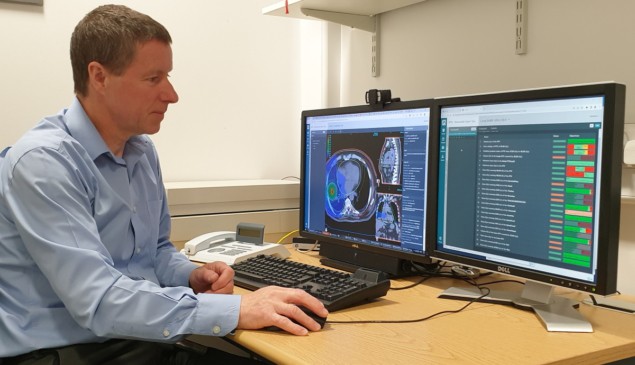NHS England’s investment in big data insights will fast-track innovation in radiation oncology
29 Jun 2022 Sponsored by Elekta
Elekta’s cloud-based software platform ProKnow is being used to centralize NHS England’s radiotherapy data while simultaneously opening up access to that data among treatment centres across the country
Precision radiation medicine specialist Elekta has shifted through the gears this year, accelerating the commercial and clinical exploitation of ProKnow, a dedicated suite of cloud-based software tools that enables regional and national networks of radiation oncology clinics to aggregate, structure and interrogate their diverse, and previously fragmented, data stores.
A lighthouse customer in this regard is National Health Service England (NHS England), the publicly funded healthcare system in England, which at the end of March confirmed an order for ProKnow licences covering 50 NHS Trust hospitals over three years (including education and training of clinical staff). The long-term vision is compelling, with ProKnow very much front-and-centre as NHS England cancer centres seek to reimagine best practice in the planning, delivery and management of their radiation therapy services while personalizing treatment to meet the clinical needs of individual patients.
Collaboration reimagined
Operationally, NHS England’s £1.4 million investment in ProKnow represents a long-term bet on collaboration and peer review, both of which are hard-wired into the software’s value proposition. After all, this is a cloud-based platform designed to harness the collective domain knowledge and expertise scattered across multiple clinical departments and multiple treatment centres. That always-on connectivity is likely to be particularly beneficial for staff at smaller radiotherapy clinics – for example, in the rural south-west of England – by facilitating informal and formal knowledge-share with radiation oncology teams in the big metropolitan hospitals.
In this way, clinicians, physicists, dosimetrists and other experts will be able to evaluate critical anatomy contouring, treatment design and plan quality as team activities – sharing the load, distributing tasks and mentoring colleagues as needed. Underpinning it all is an ever-growing knowledge repository of patient data that oncology teams can mine for clinical insights – trends, relationships, outliers, significance – to support innovation and continuous improvement in patient care.
“All of England’s radiotherapy centres have now installed their own licensed version of ProKnow – a significant logistical milestone in terms of the clinical roll-out,” explains Chris Walker, head of radiotherapy physics at the Northern Centre for Cancer Care at Freeman Hospital, Newcastle upon Tyne. “The next big step will see radiotherapy teams across England inputting their treatment planning data systematically into ProKnow – a development that will ultimately drive standardization and best practice across collaborating cancer centres.”
The medical physics team at Freeman Hospital was among the early-adopters of ProKnow, one of a network of 20 participating departments across England tasked with exhaustive road-testing of the software ahead of the bulk NHS purchase and clinical deployment. Walker, for his part, was also one of the main-movers behind the scenes, sitting on the multidisciplinary Radiotherapy Clinical Reference Group which advises NHS England on the development priorities for its radiotherapy service. “A core task for the reference group was to figure out what an optimum IT infrastructure might look like to facilitate peer review across the national radiation oncology programme,” he notes.
After an evaluation period spanning nearly three years, ProKnow emerged as the winning solution, not least because of its ability to function as a “universal translator” while networking England’s radiotherapy ecosystem. In short, ProKnow provides a vendor-agnostic software platform that can be accessed by radiotherapy departments anywhere via a simple web-based user interface – and regardless of their linac manufacturer, treatment planning system or oncology information solution.
Given ProKnow’s cloud-based architecture, robust cybersecurity is also mandatory, with all patient data encrypted in transit and at rest (while the fully HIPAA-compliant environment ensures the privacy and integrity of sensitive information). In terms of user access, ProKnow supports multifactor authentication, as well as single sign-on for institutions that have established their own federated user authentication. “Sharing of patient data between separate radiotherapy facilities complies with data protection requirements by being automatically anonymous outside the patient’s treatment centre,” adds Walker.
It’s all about execution
Functionality aside, the training and support provided by Elekta – as well as among the user community itself – will be pivotal to NHS England’s successful implementation of ProKnow over the next three years. With this in mind, the UK Institute of Physics and Engineering in Medicine (IPEM) has established a ProKnow Technical Oversight Group to focus on software commissioning and structured learning and development for radiation oncology teams. “We need to bring discipline and rigour to the technical commissioning,” explains Walker, “while also ensuring a commonality of approach for the initial applications of ProKnow across all our participating centres.”
In the near term, ProKnow will be used to create a national framework for treatment planning, driving standardization and continuous improvement across NHS England’s radiotherapy service. The aim is to enable clinical staff to take a single patient plan, or groups of plans, and benchmark against a collection of previous similar cases using so-called “treatment plan scorecards” – basically a range of predefined metrics that show dose coverage and sparing of sensitive organs to determine if they meet local protocols or nationally set guidelines. Chris Walker: prioritizing a commonality of approach for initial ProKnow applications. (Courtesy: Freeman Hospital)
Chris Walker: prioritizing a commonality of approach for initial ProKnow applications. (Courtesy: Freeman Hospital)
 Chris Walker: prioritizing a commonality of approach for initial ProKnow applications. (Courtesy: Freeman Hospital)
Chris Walker: prioritizing a commonality of approach for initial ProKnow applications. (Courtesy: Freeman Hospital)Walker and his colleagues at Freeman Hospital have already used ProKnow to design, and validate with other clinics, a set of 20 guideline scorecards for lung stereotactic body radiotherapy (SBRT). These scorecards are shared across SBRT treatment centres, allowing individual providers to perform internal audit against the guidelines for any number of patients in all categories of the dose regimens – in effect, a standardized baseline from which to develop individualized treatment plans on a patient-by-patient basis.
Meanwhile, with the input of various IPEM “task and finish” subgroups, similar efforts are already under way for other disease indications, with scorecards for breast, conventional (non-stereotactic) lung treatments, paediatric and head-and-neck radiotherapy all due for completion and roll-out this summer. “There’s a well-defined roadmap in place for how ProKnow can be put to use centrally by NHS England, aggregating and mining big data sets comprising hundreds or thousands of treatment plans,” notes John Byrne, deputy head of radiotherapy physics at the Northern Centre for Cancer Care. “The possibilities are endless once radiotherapy professionals start using ProKnow to mine their own data and collaborate with colleagues across the country.”
Make it easy
It’s clear that ProKnow’s consolidated data warehousing – at terabyte scale and beyond – will be fundamental to delivering against the NHS England roadmap, creating a powerful centralized asset that clinical teams can learn from. Furthermore, ProKnow can be bundled into the existing MOSAIQ Plaza software-as-a-service (SaaS) offerings, while there are plans to integrate with other Elekta cloud-based products such as Kaiku Health, a platform to guide treatment decisions based on the collection and management of patient-reported symptoms.
“The game-changer with ProKnow,” concludes Byrne, “is that it takes what used to be a really hard job and turns it into a really easy job. So it’s now straightforward for us to mine ProKnow’s central data store to figure out what we’re good at and what we can improve upon. Those big data insights will, in turn, drive enhanced patient outcomes and sustainable workflow efficiencies.”
from physicsworld.com 1/7/2022

Δεν υπάρχουν σχόλια:
Δημοσίευση σχολίου